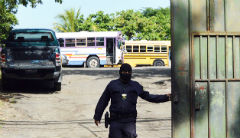One of the largest operations ever launched against El Salvador’s MS13 gang confirmed what has long been suspected — the gang’s leadership maintain extensive and sophisticated financial networks that extend far beyond the violence plagued barrios controlled by their rank and file members.
On July 28, Salvadoran prosecutors presented the first results of “Operación Jaque” (Operation Check), an unprecedented assault on the finances of the Mara Salvatrucha (MS13) gang. The operation has so far led to the issuing of 120 arrest warrants and 157 raids on gang linked businesses and properties, reported La Prensa Gráfica.
Among the business interests targeted were motels, bars, brothels, bus and taxi companies, garages and car dealerships, El Faro reported. The arrest warrants included numerous alleged frontmen and the gangs alleged finance chief, along with eight gang members identified by the authorities as the MS13’s principal leaders. Authorities have so far captured 77 people, including five of the eight leaders, but they believe the other leaders have escaped to Guatemala or Mexico, according to El Faro.
According to Attorney General Douglas Meléndez, cited in El Faro, the networks were managed by gang leaders and their collaborators and provided few benefits for the rank and file who operate on a street level.
“There is a clear difference between the leaders and the gang members,” he said. “Most gang members live in deplorable, very depressed places. The gang leaders have been personally profiting from the structure.”
InSight Crime Analysis
The exposure of these financial networks confirms the claims of numerous analysts and authorities — the MS13 in El Salvador has evolved significantly past its origins as a street gang focused on maintaining neighborhood level territories and criminal activities.
The extent and level of sophistication of its business interests are instead more reminiscent of major drug trafficking cartels and their vast business networks, which not only launder criminal profits but also generate revenues that can eclipse those from street level crimes of extortion and micro-trafficking.
SEE ALSO: El Salvador’s Gang Truce: Positives and Negatives
However, as prosecutors note, those behind these financial networks — and those benefiting from them — were not the MS13 rank and file but the leadership. The MS13 has always presented itself as a horizontally organized network, but this latest investigation suggests a much more top-down hierarchically organized structure, at least in the area of finances.
Nevertheless, with gang rules severely punishing those that personally profit from gang activities instead of distributing profits, the discovery the leadership were making huge profits not shared with the rank and file may well strain relations between the street level gang cells that provide muscle and revenue and leaders who reap the benefits.

